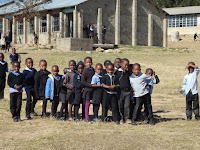Before moving to Lesotho, I was intentionally open-minded,
setting very few expectations for what my life and Peace Corps service would be
like. I am, however, human, so a few hid in the recesses of my mind, waiting to
be blown away during my time in country. Here are a few of them:
 |
| Goat on a rock |
Expectation: Life
in Village is Bucolic and Quiet
Reality Check:
Village Life is LOUD!
I do not know where the idea that country equals and
peaceful began, but it is a sham perpetuated by artists and poets for
centuries. The orchestra of sounds outside, and consequently inside, my hut at
any given moment includes the calls of a menagerie of farm animals, the yelled greetings
of people passing by, the load conversations occurring at the Chief’s office
next door, my family members singing and talking inside their house, children
playing, and-if it is sunny-the family’s solar powered radio thumping at full
volume. My hut is usually louder than my freshman year dormitory! In the middle
of the night and into the morning the chickens crow and dogs bark. In the morning
and evening, the bells of the sheep and goats ring out as they leave for and
return from grazing for the day, donkeys bray at random simply to be heard
(Donkey in Shrek is not the only
chatty donkey). Nothing about living in a rural village is quiet.
Expectation: Basotho
people are shorter than many other people
Reality Check:
Stunting is real
The internet fed me this lie before I arrived and it stuck, especially
after I arrived and found my 5’4” self to be tall. But, there are many tall
individuals, even in families that are predominantly short, showing that it is
not necessarily a genetic predisposition. In the last year, I have learned more
about stunting. Stunting occurs when young children get enough to eat but not enough nutrient
variety. The most visible impact of stunting is in fast decreased growth rates,
however, it also impacts brain development decreasing capacity for critical
thinking in adult years. In three Lesotho districts, including Botha Bothe, the
stunting rate is over 40%. So, although the children we weight each month are,
for the most part, within UN weight guidelines, they are not getting the
nutritional variety needed to support true growth. I now recognize that this is where the idea
that Basotho are short stems from.
Expectation: In
Lesotho, I Will Not Be Able to Buy Things I Want or Need
Reality Check: We
Live in a Global World
When preparing to move to a tiny, land-locked, poor country
in Africa, I mentally thought, I am packing for two years! After living on boat
for a few months at a time, I could not help but use the same packing mentality
I did when sailing: bring everything you need with you because you may not have
the ability or opportunity to get it later. This is a foolish concept. First of
all, it is impossible to pack everything one needs for two whole years anywhere
in the world. Secondly, it is possible to buy almost anything in Lesotho and if
not in Lesotho then in South Africa. The only true exception I have found to
this so far is Spaghetti Squash seeds, which I was grateful to receive in a
care package (although, yes, the care package coffee is better than what I can buy in Maseru...thank you everyone!).
As a large woman, I was worried I would not be able to find
cloths that fit me, despite seeing heavy Basotho women in videos and photos of
Lesotho, thus I bought and packed an absurd amount of skirts and tops for my
two year experience-some of which I still have not worn. I listened to serving
PCVs lament the frigid winter temperatures in Lesotho and packed multiple pairs
of long johns, ignoring where these volunteers originated from and that I am
typically warmer than others. I finally pulled them out two pair during my
second winter in Lesotho, but I could have packed just one and been fine. All
in all, I could have saved my money and bought much of what I needed here
rather than stocking up on things in America in case I might need them in
Africa.
 |
A student shares a way to reduce
HIV rates in Lesotho on
World Aids Day 2015. |
Expectation: HIV
Will Be Visible Everywhere
Reality Check:
HIV is a Silent Killer
Admittedly, there is signage about HIV Testing and HIV
Prevention everywhere in Lesotho. As the country with the second highest HIV
rate in the world, 24%, that is to be expected. At the same time, however, HIV
itself is generally hidden. Thanks to stigma and discrimination, people do not
acknowledge if they have HIV. Because HIV itself does not kill people, when
someone dies from an HIV-related illness, only they illness that actually kills
them is discussed as a cause of death. Many people choose not to take ARVs
(Anti-Retro Virals) because they do not want people to know they have HIV.
Others refuse to test because if they do not know, it is better than confirming
they have it.
Within the Peace Corps Healthy Youth Project, much of our
work is education related to HIV in hopes of overcoming these barriers to
testing and treatment, particularly in youth. Unfortunately, behavior change
and ending stigma are slow processes that will take significantly longer than
the time any individual volunteer lives in the country.
 Somehow, as I consider this, it does not shock me then that
in one of my four years in Lesotho I had
a possible HIV exposure.
Somehow, as I consider this, it does not shock me then that
in one of my four years in Lesotho I had
a possible HIV exposure. 






































